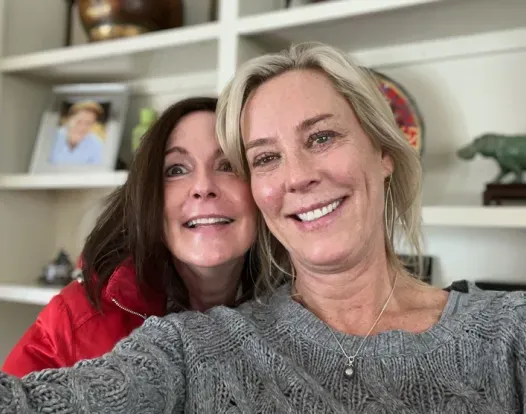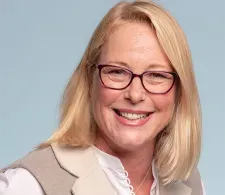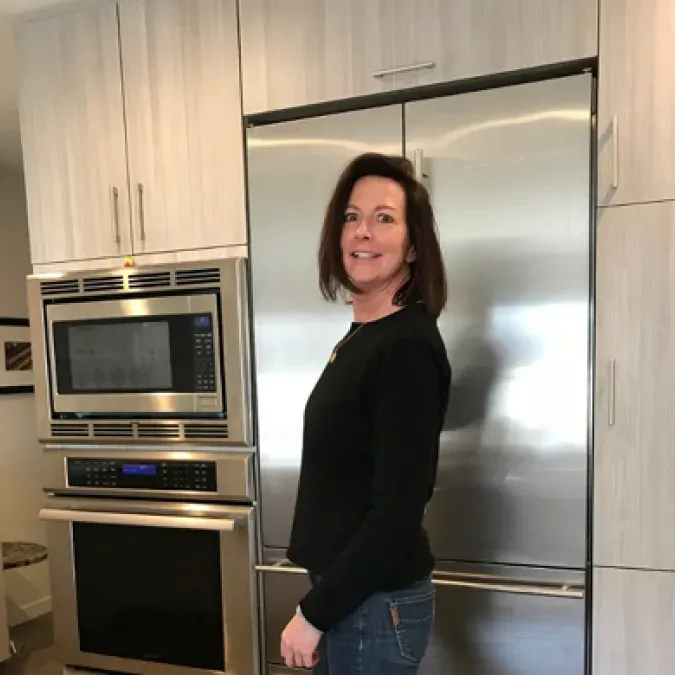Hear candid conversations between people conquering cancer – patients, their family and friends, and doctors and researchers working to help us all.
Less than 1% of patients diagnosed with glioblastoma multiforme (GBM) – an aggressive form of brain cancer – live longer than a decade. But Molly is one of those rare survivors. Her best friend, Martha, and Martha’s sister, Conquer Cancer board member Dr. Amy Peterson, fiercely supported Molly every step of the way.
Molly tells Your Stories host, Dr. Mark Lewis, how she navigated her experiences with cancer. Martha recounts how she supported Molly through her journey. And Dr. Amy Peterson discusses how cancer research informed Molly’s course of care. Together, the trio celebrates the power of leaning on loved ones for support and shares why donor-funded research is vital to advance treatment for all patients.


Close to 50% of people with GBM pass away within one year of diagnosis and less than 1% of patients with GBM live longer than a decade, but Molly is a survivor. Her best friend, Martha Carland, and Martha’s sister, Conquer Cancer board member Dr. Amy Peterson, fiercely supported Molly every step of the way.
In this episode, Molly tells Your Stories host, Dr. Mark Lewis, how she navigated her experiences with cancer; Martha recounts how she supported Molly through her journey; and Dr. Peterson discusses how cancer research informed Molly’s care. Together, the trio celebrates leaning on loved ones for support and shares why donor-funded research is vital to the advancement of treatment for all patients.
From left to right: Molly and Martha (larger image), Dr. Peterson (smaller image)

WHAT YOU'LL HEAR IN THIS EPISODE:
• Reflections from a survivor who beat the odds
• How a friend and sister helped their loved one navigate cancer care
• Tips from a survivor for patients who are navigating a sudden cancer diagnosis
Overcoming the Odds
Many patients with cancer notice the signs and experience the symptoms long before diagnosis, but the opposite occurred with Molly. Her sudden diagnosis with GBM – an advanced-stage type of brain tumor that is difficult to treat – meant her chances of living more than one year were like the flip of a coin.
“I recall very much being grim about the very likely outcome that Molly was going to face, which was not surviving,” says Dr. Peterson. “Nearly half of people who are diagnosed with GBM die before a year is up, and 95% die within five years, and over 99% die within 10 years; which means Molly is in the 1% who live more than 10 years."
Having a best friend in Martha and a medical oncologist in Dr. Peterson as her immediate support system made a world of difference as Molly began treatment.
“After the crummy curveball, it was sort of like, ‘I have access to really good standard of care,’” says Molly. “But then it gets better. Because I have Martha and Amy.”
Promising Research: Targeting Brain Tumors
Molly’s care plan mirrored a standard treatment approach: surgical removal of cancerous material, followed by chemotherapy and radiation therapy. Like with all standards of care, research was vital to solidifying this sequence as Molly’s best course of action.
“Decades of research have led neuro-oncologists to understand exactly how much radiation to give, what type of radiation to give, how to focus it,” says Dr. Peterson, adding that the type of chemotherapy Molly received helps to boost the effectiveness of radiation therapy. “All of that, just the standard of care, comes from research.”
In addition to standard care, Dr. Peterson advocated for Molly’s access to the drug Avastin during and after chemotherapy. Avastin targets vascular endothelial growth factor (VEGF), a vital protein that helps to form new blood vessels. But GBM overproduces VEGF, leading to health complications in patients. When Molly received her diagnosis, Avastin was still being evaluated, meaning it wasn’t approved for patients with previously untreated GBM.
Ultimately, studies revealed that although Avastin temporarily prevented the progression of disease in patients, it didn’t improve overall survival. However, there were some populations of patients who appeared to benefit from Avastin.
“Molly’s [care] team and I talked about the data and agreed that it was worth keeping her on Avastin for as long as possible. Avastin was truly the cutting-edge research component of her treatment at the time,” says Dr. Peterson. “I think having this ability to speak to [her] oncologist – and discuss the data in detail – is what made the difference in Molly’s care.”
Research made this promising drug available to Molly, and Dr. Peterson helped connect the dots.
“I don’t believe Avastin would have been offered to Molly if Amy wasn’t involved,” says Martha.
Different Ways of Conquering Cancer
Now more than 10 years cancer-free, Molly gives back to help advance research. She wants more patients to have access to timely and quality treatment and care.
“I have the best life, and I know it,” says Molly. “Now, I’m clearing the way to figure out what’s next – how I can make things better for someone, or more than one person. I have so much left, more to give, more to do.”
Martha admires the way Molly maintained a positive attitude and modeled perseverance throughout her experience with cancer.
“Molly never let her diagnosis define her,” says Martha. “And I think that’s also how Molly continues to conquer cancer.”
And as Dr. Peterson continues volunteering on the Conquer Cancer board, she maintains her dedication to raising funds for research and vital programs. The benefits of this important work ultimately reach patients like Molly, who now has more time to experience life.
“I knew I wanted to do more, and so it became a no-brainer for me, to go out and find donors who are willing to advance cancer care. Being able to fund cancer researchers – and seeing their appreciation and gratitude for that funding – it’s an amazing feeling,” says Dr. Peterson. “Being able to listen to the joy of Molly’s laughter – it’s a blessing.”

